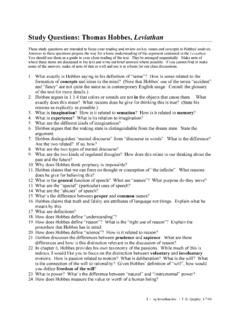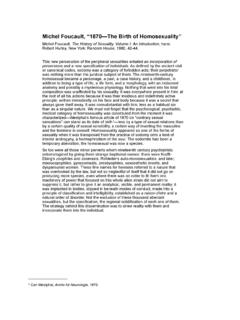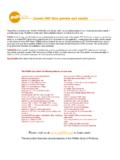Transcription of Maurice Merleau-Ponty: The World of Perception
1 The World of Perception This is that rare genre, the careful popularisation, done bythe original author. In simple prose Merleau-Ponty toucheson his principal themes. He speaks about the body and theworld, the coexistence of space and things, the unfortunateoptimism of science and also the insidious stickiness ofhoney, and the mystery of anger. These lectures are slightbut not superficial: you can feel the deep consonance withLacan and the unspoken debt to Heidegger. Breton, Bataille,Blanchot, Ponge, Kafka, Proust, C zanne, and Sartre floatthrough the text, each one impeccably well cited. And it is allposed in a lovely calm tone, which I read as Merleau-Ponty sdeep and unacknowledged affinity with his foil, Descartes. JAMESELKINS, AUTHORSTORIES OFART A N DPICTURES ANDTEARS Merleau-Ponty is one of the seminal thinkers of the post-war period, and these short talks to a radio audience, from arelatively early moment in his writing career, show hishumane intelligence at work.
2 MICHAELFRIED, JOHNSHOPKINSUNIVERSITYMAURICEMERLEAU-PON TYThe World of PerceptionTRANSLATED BY OLIVER DAVISF irst published in French as Causeries 1948 Editions du Seuil, 2002 First published 2004by Routledge2 Park Square, Milton Park, Abingdon, Oxfordshire OX14 4 RNSimultaneously published in the USA and Canadaby Routledge29 West 35th Street, New York, NY 10001 Routledge is an imprint ofthe Taylor & Francis GroupTranslation Routledge 2004 Introduction Thomas Baldwin 2004 This book is supported by the French Ministry for Foreign Affairs, as part oftheBurgess Programme headed for the French Embassy in London by the InstitutFran ais du rights reserved. No part ofthis book may be reprinted or reproduced orutilised in any form or by any electronic, mechanical, or other means, now knownor hereafter invented, including photocopying and recording, or in any informationstorage or retrieval system, without permission in writing from the Library Cataloguing in Publication DataA catalogue record for this book is available from the British LibraryLibrary of Congress Cataloging in Publication DataMerleau-Ponty, Maurice , 1908 1961[Causeries 1948.]
3 English]The World of Perception / 0-415-31271-X (Hardcover : alk. paper)1. Perception (Philosophy) I. Title 2004121 .34 dc222003026843 ISBN 0 415 31271 XThis edition published in the Taylor & Francis e-Library, 0-203-49182-3 Master e-book ISBNISBN 0-203-33727-1 (Adobe eReader Format)(Print Edition)ContentsForewordby St phanie M nas viiIntroductionby Thomas Baldwin11 The World of Perception and the World of Science372 Exploring the World of Perception : Space473 Exploring the World of Perception : Sensory Objects574 Exploring the World of Perception : Animal Life675 Man Seen from the Outside796 Art and the World of Perception917 Classical World , Modern World103 Notes115 Index123 ForewordThe seven lectures collected in this volume were commis-sioned by French national radio and broadcast on its NationalProgramme at the end of 1948. Copies have been kept at theInstitut National de l Audiovisuel for use by researchers andother professionals seven talks were written by Maurice Merleau-Ponty fora series of radio broadcasts and delivered by him in to the official radio listings, six were broadcast onthe French national station, one each week, between Saturday9 October and Saturday 13 November 1948.
4 The lectureswere recorded for a programme called The French CultureHour and were read continuously, without of the recordings have been kept at the InstitutNational de l Audiovisuel (INA).viiOn Saturdays, the general theme of this programme was The development of ideas . Merleau-Ponty s lectures werebroadcast on the same day as others by Georges Davy (on thepsychology of primitive peoples), Emmanuel Mounier (onthe psychology of character), Maxime Laignel-Lavastine (onpsychoanalysis) and Emile Henriot of the Acad mie Fran aise(on psychological themes in literature). The INA s archivessuggest that there is no surviving record of the preamble intro-ducing the speakers and specifying the precise topic of lectures were devised by Merleau-Ponty to form aseries and it was he who decided on their order and individualtitles: (1) The World of Perception and the World of Science;(2) Exploring the World of Perception : Space; (3) Exploringthe World of Perception : Sensory Objects; (4) Exploring theWorld of Perception : Animal Life; (5) Man Seen from theOutside; (6) Art and the World of Perception ; (7) ClassicalWorld, Modern edition is based on the typewritten text prepared byMerleau-Ponty from his written plan.
5 These papers (which arepart of a private collection) carry corrections in the author sown recording is, for the most part, a faithful rendition byMerleau-Ponty of his written text. Bibliographical referencesforewordare preceded by a number. We have endeavoured to go back tothe editions available to Merleau-Ponty and his contempo-raries. Our research reveals just how scrupulously attentiveMerleau-Ponty was to recent and newly published work. Booksreferred to are listed in the bibliography at the end of would like to express our particular thanks to those atthe INA who have assisted us in our research into the broad-casting of these phanie M nas ixIntroductionTHOMASBALDWINMAURICE MERLEAU-PONTY (1908 61)Merleau-Ponty was one of the most creative philosophers ofthe twentieth century. He combined a new way of thinkingabout the basic structures of human life with reflections on art,literature and politics which draw on this new lively radio talks from 1948 show him at the height ofhis powers, moving easily between philosophical themes anddiscussions of painting and politics; the emphasis on paintingis indeed specially notable here, as is the way in which he usesthis to indicate his philosophical themes.
6 The result is a brieftext which provides the best possible introduction to his phi-losophy, especially since this is dominated by a larger and morecomplex text published in 1945 Phenomenology of these talks should also be valued in their own right, for inmany respects the contrasts with the past which Merleau-Ponty1draws and the anxieties which he articulates are still ours. In myown introduction, after a brief account of Merleau-Ponty slife and philosophy, I shall say a little about each talk ( lecture ),connecting them with Merleau-Ponty s other writings, and alsoreflecting briefly on their significance for s father died in 1913 while he was still a smallchild, and, along with his brother and sister, he was brought upin Paris by his widowed mother. This situation of growing upwithout a father was one which he shared with Jean-Paul Sartreand Albert Camus, and was indeed common throughoutEurope after the First World Merleau-Ponty s case,despite the absence of a father, this period seems to have beenone of exceptional happiness and intimacy, and he carried thememory of it throughout his life:It is at the present time that I realize that the first twenty-five years of my life were a prolonged childhood, destinedto be followed by a painful break leading eventually toindependence.
7 If I take myself back to those years as Iactually lived them and as I carry them within me, myhappiness at that time cannot be explained in terms ofintroductionthe sheltered atmosphere of the parental home; the worlditself was more beautiful, things were more attending lyc e Merleau-Ponty gained admission in 1926to the cole Normale Sup rieure (where he briefly encounteredSartre, though they were not then friends). He graduated in1930 and went to teach at a lyc e in Beauvais; in 1935 hereturned to Paris to a junior position at the cole this period he was working on his first doctoral thesis, acritical survey of psychological theory with special emphasis onGestalt theory. This was published asThe Structure of Behaviorin1942, during the German occupation of 1939 40 Merleau-Ponty had served briefly in the French army as a secondlieutenant, but after the German victory he was demobilised andreturned to Paris.
8 There he taught at a couple of lyc es whilewriting a second, higher, doctoral thesis, as the French academicsystem then required of anyone who wanted to pursue an aca-demic career in the University system. In this workMerleau-Ponty continued the emphasis on psychology of hisprevious book, but he now approached the subject with a per-spective informed by phenomenology , the philosophicalmethod which had been initiated at the start of the century bythe German philosopher, Edmund Husserl, whose unpublishedmanuscripts Merleau-Ponty had been able to study at Louvain3shortly before the war. This second thesis was published in 1945,soon after the liberation of France, as Phenomenology of is Merleau-Ponty s major, and enduring, contribution tophilosophy. I say more about it in my discussion the German occupation of France Merleau-Pontyinitially joined Sartre, with whom he now became a close friend,in a quixotic attempt during 1941 to constitute an intellectualresistance movement ( Socialism and Freedom ) distinct fromthe forces of the communists and the move-ment collapsed at the end of the year, largely because of itsineffectiveness; and Merleau-Ponty and Sartre then withdrew towrite their major works of philosophy (Sartre s Being andNothingnessdates from this period).
9 7 Later in the war Sartre andMerleau-Ponty joined Camus in the group which published theresistance paper Combat, though they took little active part inthe resistance. Nonetheless, the experience of the Germanoccupation forced Merleau-Ponty to think much harder aboutpolitics than he had previously done,8and at the end of 1944 Merleau-Ponty was one of the group of leading intellectuals,led by Sartre and also including de Beauvoir and Aron, whofounded the influential political journal Les Temps then helped Sartre edit the journal until 1950when their different political judgments about communismmade continued collaboration the publication ofPhenomenology of Perceptionin 1945 Merleau-Ponty s academic career progressed quickly. In 1945he was appointed a Professor at Lyon; in 1950 he becameProfessor of Psychology at the Sorbonne in Paris; and then in1952 he was appointed to the most prestigious position for aFrench philosopher, the chair in philosophy at the Coll ge deFrance, a position which he held until his unexpected earlydeath in 1961.
10 During this period he published three collec-tions of essays: Sense and Non-Sense (1948) which bringstogether his early post-1945 essays, of which most are aboutMarxism and politics;10 The Adventures of the Dialectic(1955)which deals with his break with Sartre and includes his laterthoughts about Western Marxism;11finally, Signs(1960)which contains some new philosophical work, mainly on lan-guage, together with further political his deathit became apparent that Merleau-Ponty had been working ona major new monograph. This had originally been intended asa study of language and truth which would develop themesfrom the earlier writings under the title The Origin of Truth ;but as the work progressed Merleau-Ponty found himselfdrawn back to some of the themes concerning Perception thathe had addressed in his earlier philosophy, and the manuscriptthat was published posthumously in 1964 bears Merleau-Ponty s later working title, The Visible and the his death Merleau-Ponty s reputation in Francedeclined quickly as French philosophers turned away fromFrench existential phenomenology to the study of Germanphilosophy, especially to the works of Heidegger and the mas-ters of suspicion Marx, Nietzsche and Freud.







